| Srl | Item |
| 1 |
ID:
103686
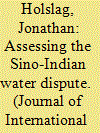

|
|
|
| 2 |
ID:
067350
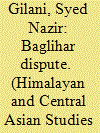

|
|
|
| 3 |
ID:
127771
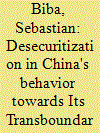

|
|
|
|
|
| Publication |
2014.
|
| Summary/Abstract |
Fresh water has no substitute, and its availability has been declining sharply around the globe. In Asia, China's role as a multidirectional and transborder water provider is unmatched. Analysis of China's behavior towards its transboundary rivers is therefore pivotal. By examining three different case studies-the Mekong River in Southeast Asia, the Brahmaputra River in South Asia and the Irtysh and Ili Rivers in Central Asia-this article seeks to lay the theoretical groundwork for understanding China's behavior. It pits previously applied realist rationales against the more recent notion of desecuritization strategies and makes a case for the latter. While desecuritization implies non- or de-escalation, it does not necessarily mean genuine long-term cooperation. The future of Asia's shared waters may thus be a contentious one.
|
|
|
|
|
|
|
|
|
|
|
|
|
|
|
|
| 4 |
ID:
146748
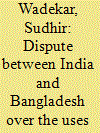

|
|
|
|
|
| Summary/Abstract |
The Ganges River is very important for India, particularly for Uttar Pradesh, Bihar and West Bengal. The Farakka Barrage was built for the main purpose of flushing out the silt of Bhagirathi-Hoogly River, through it ships can navigate from Bay of Bengal to Calcutta. Initially Pakistan raised question on the Farakka Barrage. After the emergence of Bangladesh, the Ganges water dispute becomes an important issue between India and Bangladesh. Bangladesh tried to internationalize the water sharing issue.
|
|
|
|
|
|
|
|
|
|
|
|
|
|
|
|
| 5 |
ID:
066608
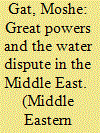

|
|
|
| 6 |
ID:
140373
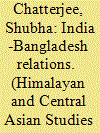

|
|
|
| 7 |
ID:
152373
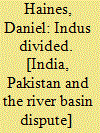

|
|
|
|
|
| Publication |
Gurgaon, Penguin Randam House India Pvt. Ltd., 2017.
|
| Description |
xi, 264p.hbk
|
| Standard Number |
9780670089628
|
|
|
|
|
|
|
|
|
|
|
|
Copies: C:1/I:0,R:0,Q:0
Circulation
| Accession# | Call# | Current Location | Status | Policy | Location |
| 059005 | 341.442/HAI 059005 | Main | On Shelf | General | |
|
|
|
|
| 8 |
ID:
106688
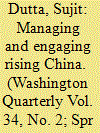

|
|
|
| 9 |
ID:
133898
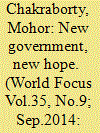

|
|
|
|
|
| Publication |
2014.
|
| Summary/Abstract |
An assessment of the foreign policy balance-sheet of the United Progressive Alliance (UPA) administration reveals its ineptitude in resolving the issue of water-sharing of the Teesta River with Bangladesh, the legacy of which has been inherited by its successor, the Bharatiya Janata Party (BJP) Government, under the leadership of Narendra Modi, who adorned the Prime Minister's Chair on 26 May 2014. The legacy of this contentious bilateral issue can be traced back to the Second Phase of the UPA administration (UPA-II) in 2011, when the Chief Minister of the Indian state of West Bengal, Mamata Banerjee refused to budge on her decision of not sharing the Teesta river water with Bangladesh.
|
|
|
|
|
|
|
|
|
|
|
|
|
|
|
|
| 10 |
ID:
167323
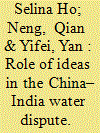

|
|
|
|
|
| Summary/Abstract |
Both the Chinese and Indian governments have made assiduous efforts to desecuritise their water dispute. This is puzzling, because both countries have securitised most of the disputes between them, including the border dispute, Tibet, and the Dalai Lama issue. The triggers for securitisation exist in the China–India water dispute. Both countries are water-scarce, prone to floods and droughts in their shared river basins, and the water dispute is inextricably linked to their border dispute. Power asymmetries between the two countries also incentivise both sides to securitise their water dispute. China, the upstream riparian and more powerful of the two, could use water as leverage in border negotiations, while India could use securitisation as a tactic to gain attention and offset China's greater aggregate power. The tendency is also for water disputes around the world to be painted as existential threats. Why, then, do China and India desecuritise their water dispute? Furthermore, despite desecuritisation, cooperation between them has remained low, confined to an expert-level mechanism, and memorandums of understandings on sharing hydrological data. This refutes the conventional view that desecuritisation is a normative good that can lead to genuine cooperation. This paper uses the Q methodology, which is a quantitative measure of ideas and perceptions, to address these puzzles. Based on a Q survey of Chinese and Indian experts on the water conflict, we argue that ideas are essential to shaping Chinese and Indian behaviour. Material explanations do not adequately explicate the complexities and nuances of the water dispute because they are too broad and general to be useful. The Q survey revealed in depth the myriad of ideas and debates surrounding the water dispute. These views and beliefs explain why the Chinese and Indian governments desecuritise their water dispute and why, despite desecuritisation, cooperation remains low.
|
|
|
|
|
|
|
|
|
|
|
|
|
|
|
|
| 11 |
ID:
179646
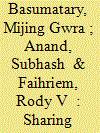

|
|
|
|
|
| Summary/Abstract |
Nation-states emerged during the nineteenth and twentieth century and is still emerging which is very recent to trace the importance of Rivers. Without river there were no civilisations that develop into nation-states. What binds together in the shape of civilisations was through river and develops into nation-states. Mention may be made of Mesopotamian civilisation begin in the rivers between Euphrates and Tigris; Chinese Civilisation along the Yellow and Yangtze Rivers; Egyptian civilisation in the Nile River; Indus Valley Civilisation in the Indus River Valley.
|
|
|
|
|
|
|
|
|
|
|
|
|
|
|
|
| 12 |
ID:
139369
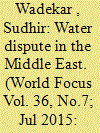

|
|
|
|
|
| Summary/Abstract |
this article an attempt is made to find out answers to the questions- How is the Jordan basin divided among the beneficiary states? Which plans are designed for the development of the basin? Which projects are implemented? How are the relations among the riparian states? What is the situation Palestinians in the West Bank and Gaza Strip? What role is performed by the superpowers
|
|
|
|
|
|
|
|
|
|
|
|
|
|
|
|
| 13 |
ID:
179643
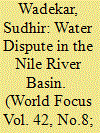

|
|
|
|
|
| Summary/Abstract |
Many ancient civilizations center found on famous rivers — the Euphrates and the Tigris (Babylon), the Yangtze (China), the Ganges (India), and the Nile (Egypt) (Hussein 2014). The famous Greek historian Herodotus wrote in the fifth century B.C., ‘Egypt is the gift of the Nile’ (Swain 1997: 676). The Nile River basin act as ideal case studies to ask the following questions: 1) How do riparian states in transboundary basins achieve water security, and 2) In the face of increasing water scarcity, will efforts to achieve water security lead to increased conflict throughout the region or will they lead riparian states to cooperate in an effort to conserve their shared water resources? To answer these questions, importance given to the hydrogeography, history, and hydropolitics of the basins and riparian states (Ward and Roach 2010: 52).
|
|
|
|
|
|
|
|
|
|
|
|
|
|
|
|